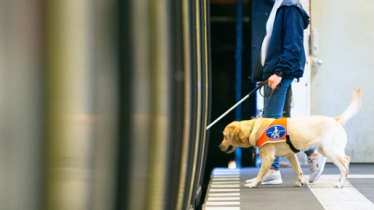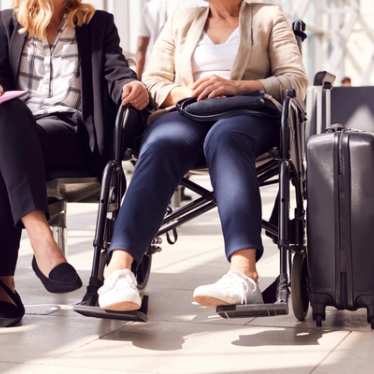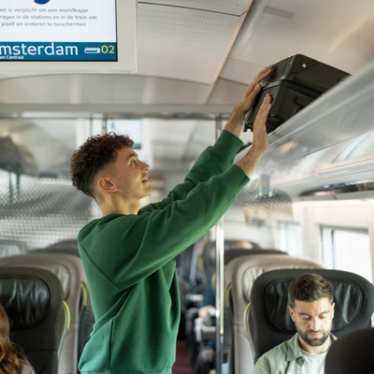
- Travel info
- Travel planning
- Assistance dogs
Guide and assistance animals
Travelling with a guide or an assistance animal? Find out how to bring your helpful furry friend on board

Travelling on Eurostar with assistance animals
To travel on Eurostar, guide and assistance dogs and cats must meet certain requirements. Find out below all the information you need to bring your assistance animal on board.
Travelling with guide and assistance animals
When travelling between France, Belgium, the Netherlands, and Germany, you don’t need to provide any documentation for your guide dog, assistance dog, or assistance cat. They travel for free, and they don’t need a ticket.
You’ll just need to tell the train manager that your guide or assistance animal is on board. Let them know as they walk through the train.
Please be aware that this information concerns guide and assistance animals only. Want to bring your pet on board? Read our handy guide here.

Travelling to the UK with guide and assistance animals
If you’re travelling to the UK with a guide or assistance animal, strict border control regulations are in place. All guide dogs, assistance dogs and assistance cats entering the UK must have a ticket for travel, as well as certain documentation and vaccines. You’ll also need to fill out a pre-approval form at least 24 hours before travel.
For more info, head to the ‘Travelling to and from London’ tab of this page.

Dangerous dogs
Any dogs meeting the following criteria won’t be allowed to travel on any of our services.
- Dogs on the UK list of banned dog breeds
- Dogs in categories 1 and 2 of the French list of dangerous dogs.
This applies even if your dog is a registered guide or assistance dog.

Lounge access for guide and assistance animals
If your ticket type includes access to our lounges, you can bring your furry friend along with you. For hygiene reasons, we ask that you please keep them off the furniture.
Travelling to and from London with assistance and guide animals
To travel with a guide or assistance animal on a train to and from London we ask customers to contact us at least 24 hours before departure and book a space for their beloved companions. Rest assured, there is no charge for the guide and assistance animal's ticket.
To travel, guide and assistance animals must meet certain requirements and have the correct documentation to enter or leave the UK.
Find all the information you need to travel with your guide and assistance animal below.

Booking your journey with an assistance animal
To travel, there must be a valid Eurostar ticket for both the owner and the guide or assistance dog or cat. There is no charge for a guide or assistance dog or assistance cat’s ticket which can be booked through our contact form (select Assistance, then Assistance Animals) or by calling:
- From the UK: (+44) (0)3432 186 186
- From Belgium: (+32) 2 400 6776
- From France: (+33) 1 70 70 60 88
- From the Netherlands: (+31) 20 5323232
- From Germany: (+49) (0) 30 700 70000
In order to travel, we will ask for basic information via a pre-approval form regarding the dog or cat at the time of booking.
It is important that customers contact us at least 24 hours before they travel and declare the intention to travel with a guide or assistance dog or assistance cat and to make the dog or cat’s booking.
We will book a spare seat next to the customer to ensure the dog or cat has enough space. A maximum number of four guide or assistance dogs or assistance cats (in total) are permitted per train.

Travel documents
When travelling between the UK and the EU, you'll need the following documents for your guide or assistance dog or assistance cat:
- Their own Eurostar ticket
- A microchip or a tattoo applied on or before 3 July 2011 (opens in a new tab)
- A valid rabies vaccination (opens in a new tab)
- A valid tapeworm vaccination (opens in a new tab) (for dogs, when travelling to the UK)
- An animal health certificate (opens in a new tab), unless you have a pet passport issued in an EU country or Northern Ireland
- Proof that your pet has been accepted for travel with Eurostar (validated documentation, a copy of your confirmation email or your case reference number from Eurostar)
Find out more on the UK government website (opens in a new tab).
Important: Please check that your guide or assistance dog or assistance cat has the correct documents and vaccinations well in advance. Otherwise, your dog or cat may be placed in quarantine for up to four months.
Please check the rules of the country you’re travelling to for any additional restrictions or requirements before you travel.

On the day
On the day of departure, you must arrive in the station at least 60 minutes before your train departs, with the following documents.
Your documents
- Your Eurostar ticket
- Your passport
Your dog’s or cat’s documents
- Their Eurostar ticket
- Their travel documents outlined above
- Proof that they’ve been accepted for travel with Eurostar (validated documentation, a copy of your confirmation email or your case reference number from Eurostar)
Important
Please check your dog or cat has the correct documents and vaccinations well in advance. Otherwise, they may be placed in quarantine for up to four months.
Please note that we allow guide or assistance dogs and assistance cats as an auxiliary aide. Therefore, we only accept guide or assistance dogs or assistance cats travelling with their owners.
Where to go
You must arrive at the station 60 minutes before your train departs.
No matter where you are travelling to or from, you’ll need to see a member of Eurostar staff, who will complete the final travel document checks for your guide or assistance dog or assistance cat, and approve the animal for travel.
If you don't see a Eurostar staff member before making your way through the ticket gates, we cannot approve the animal for travel.
Dangerous dogs
Any dogs meeting the following criteria won’t be allowed to travel on any of our services.
- Dogs on the UK list of banned dog breeds
- Dogs in categories 1 and 2 of the French list of dangerous dogs.
This applies even if your dog is a registered guide or assistance dog.
Lounge access for guide and assistance animals
If your ticket type includes access to our lounges, you can bring your furry friend along with you. For hygiene reasons, we ask that you please keep them off the furniture.
Emotional support animals
If you require an emotional support animal to travel, please get in touch with us to discuss your requirements.

Destinations
You can travel with a guide or assistance dog or assistance cat between these stations:
In the UK:
London St Pancras International
Across Europe:
Paris Gare du Nord
Brussels-Midi/Zuid
Lille Europe
Amsterdam Centraal
Rotterdam Centraal

Accessible travel information and contact details
For more information visit our accessible travel hub or download our PDF guide: Making rail accessible: Helping older and disabled passengers (opens in a new tab) (opens a PDF) and our audio version: Making rail accessible: Helping older and disabled passengers (opens in a new tab) is also available.
Contact us
You can get in touch with our team during the following UK hours:
- Monday to Sunday, including holidays – 08:00 - 20:00 (CET time)
By phone:
- From the UK: (+44) (0)3432 186 186
- From Belgium: (+32) 2 400 6776
- From France: (+33) 1 70 70 60 88
- From the Netherlands: (+31) 20 5323232
- From Germany: (+49) (0) 30 700 70000
By email:
Get in touch by filling out this contact form and selecting the Accessible Travel button.
Important: the urgent assistance request should be selected only if you are travelling out of our office hours and your journey is within the next 24 hours.
Or write to:
Eurostar Assistance Team
2nd Floor Kent House
81 Station Road
Ashford Kent
TN23 1AP
UK

Pet Travel helpline
If you have any general questions, please contact the Pet Travel helpline.
Phone: +44 (0)370 241 1710 (open Monday to Friday 08:30 – 17:00, UK time)
Email: pettravel@apha.gov.uk
You can also find helpful information on the UK government website (opens in a new tab).








